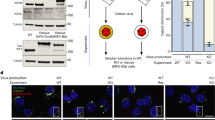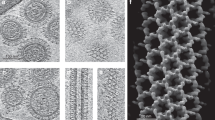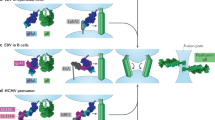Abstract
A STUDY of the early hours of multiplication of herpes virus in chick embryo cells1 showed that some 90 per cent of the virus present in the cells at the beginning of incubation could not be detected 3 and 6 hr. later. The method of cell homogenization employed in this work to extract virus for titration left the cell nuclei intact, and the findings of Gray and Scott2 suggested that the virus lost in the early hours of incubation might have made its way into the nuclei, and so escaped detection. This possibility was investigated.
This is a preview of subscription content, access via your institution
Access options
Subscribe to this journal
Receive 51 print issues and online access
$199.00 per year
only $3.90 per issue
Buy this article
- Purchase on Springer Link
- Instant access to full article PDF
Prices may be subject to local taxes which are calculated during checkout
Similar content being viewed by others
References
Gostling, J. V. T., and Bedson, S. P., Brit. J. Exp. Path. (in the press).
Gray, A., and Scott, T. F. McN., J. Exp. Med., 100, 473 (1954).
Author information
Authors and Affiliations
Rights and permissions
About this article
Cite this article
GOSTLING, J. Intracellular Site of Developing Herpes Virus. Nature 178, 1238–1239 (1956). https://doi.org/10.1038/1781238b0
Issue Date:
DOI: https://doi.org/10.1038/1781238b0
Comments
By submitting a comment you agree to abide by our Terms and Community Guidelines. If you find something abusive or that does not comply with our terms or guidelines please flag it as inappropriate.



